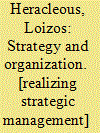| Srl | Item |
| 1 |
ID:
085140


|
|
|
|
|
| Edition |
2nd ed.
|
| Publication |
London, Economica, 2006.
|
| Description |
xiii; 349p.Pbk
|
| Standard Number |
9782717852448
|
|
|
|
|
|
|
|
|
|
|
|
Copies: C:1/I:0,R:0,Q:0
Circulation
| Accession# | Call# | Current Location | Status | Policy | Location |
| 054068 | 658.401219/GOD 054068 | Main | On Shelf | General | |
|
|
|
|
| 2 |
ID:
046040


|
|
|
|
|
| Publication |
Oxford, Blackwell Publishing Ltd, 2003.
|
| Description |
viii, 450p.Pbk
|
| Standard Number |
0631226109
|
|
|
|
|
|
|
|
|
|
|
|
Copies: C:1/I:0,R:0,Q:0
Circulation
| Accession# | Call# | Current Location | Status | Policy | Location |
| 046812 | 658.4012/CUM 046812 | Main | On Shelf | General | |
|
|
|
|
| 3 |
ID:
128244


|
|
|
|
|
| Publication |
2013.
|
| Summary/Abstract |
It is crucial for states to define a justified and well-structured maritime strategy in a competitive maritime security environment. Any flaws could jeopardize the security of the people and the protection of the states' maritime interests. Furthermore due to long term investment needs of the strategy, it would lead states to waste their financial resources on the wrong assets. Governments, already under increased scrutiny by the public over their defense expenditures, pay more attention where to invest their money. Therefore, the process of forming the maritime strategy of a country requires careful analysis and a methodical approach to the problems.
Just like the competition at sea, firms in various industries face rivalry and need to determine the right strategy to cope with the challenges in their respective industries. Companies that could not keep up with the change caused by the globalization fail in their respective industries. Therefore many firms implement the strategic management process in order to stay in the game. The first phase of strategic management is the strategic planning. Before planning its strategy, a firm needs to analyze the driving forces of the particular industry. One of the most renowned methods to analyze an industry is 'Porter's Five Forces Analysis'.1 It is assessed in this study that 'Porter's Five Forces' is applicable to the analysis of maritime security environment where the players and content of the driving forces are totally different from that of the business industry analysis. Furthermore, this analysis could help military leaders fully comprehend the maritime security environment and keep track of the drastic change in it. Thus, they can model an effective maritime strategy that is justifiable both to the public and budget planners.
|
|
|
|
|
|
|
|
|
|
|
|
|
|
|
|
| 4 |
ID:
075449


|
|
|
| 5 |
ID:
053542


|
|
|
|
|
| Publication |
Cambridge, Cambridge University Press, 2003.
|
| Description |
xx, 232p.Pbk
|
| Standard Number |
0521812615
|
|
|
|
|
|
|
|
|
|
|
|
Copies: C:1/I:0,R:0,Q:0
Circulation
| Accession# | Call# | Current Location | Status | Policy | Location |
| 048557 | 658.401221/HER 048557 | Main | On Shelf | General | |
|
|
|
|
| 6 |
ID:
147514


|
|
|
|
|
| Summary/Abstract |
Nowadays we witness a fundamental change in the perception of space-related issues. Once being a symbol of technological race and competition between opposing political systems, space studies have become a part of everyday life and an indispensable means in achieving economic, scientific, political and social goals. This research addresses space studies of Turkey -a late comer but rapidly progressing country in this field-which is recently emerging in the area of high technologies. In this context, major policies and projects which have brought the country to its present level are discussed. The current status of Turkish space industry is defined through SWOT analysis and a proposal for the country's space vision covering the next 20 years is put forward. Strategies and policies that will be supportive in achieving the proposed space vision are introduced.
|
|
|
|
|
|
|
|
|
|
|
|
|
|
|
|